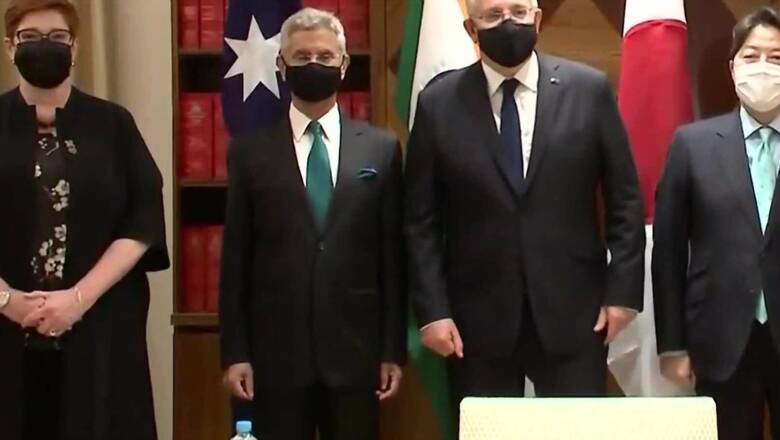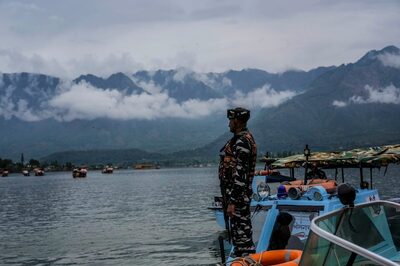
views
Even as the Ukraine crisis persists, US secretary of state of State Antony Blinken attended the QUAD foreign ministers’ meeting in Melbourne on February 11. He ensured that not only did he highlight this aspect but also utilise the forum and the bilateral meetings to discuss “Russian aggression”.
In the joint press conference, Antony Blinken said, “Even as we continue to work relentlessly to try to resolve the crisis in Ukraine brought about by Russian aggression and to do that through diplomacy and deterrence – but being here now, even in the midst of that, I think only underscores our commitment to staying focused on the Indo-Pacific.”
But significantly, Blinken underlined why the US raised the issue of Russia in the Quad Ministerial meeting and how the US believes it is connected to the overall aim of even the Quad to defend the freedom and sovereignty. He said, “One of the reasons we’re working so intensively to defend the core principles threatened by Russia’s aggression toward Ukraine is because those very same principles are crucial to enduring stability in this region and every other part of the world.”
Russia has a little over one lakh troops on the border with Ukraine for about a month now. However, Russia has indicated it has no intention to invade the former Soviet region.
Despite the situation on the border not having changed in the past few weeks, the US and UK have asked their citizens to leave Ukraine, further indicating they expect an invasion from Russia, and as per the US, before the Winter Olympics end, which is 20th of February.
The suspicion of the West is based the Crimea precedence (of 2014). As some diplomats explain that Russia continued to dismiss suggestions that they had no intention to annex Crimea, however, within days the annexation was complete though no blood was shed.
The then Russian Permanent Representative to the UN, Vitaly Churkin, had said Russia would vote against any resolution in United Nations Security Council (UNSC) because even as Moscow would respect the decision of the Crimeans, it did not accept the basic assumption of the draft resolution, which aimed “to declare illegal the planned March 16 referendum where residents of the Republic of Crimea should decide on their future”.
Russia had claimed that additional Russian troops and armoured vehicles were deployed in Crimea for a smooth referendum. The Crimean lawmakers had already voted to join Russia and the referendum was being held to validate the decision.
It is for this reason that some countries like the UK expressed disappointed with India’s abstention of vote at the UNSC to discuss the Ukraine issue on January 31. However, News18 has learnt that India explained its position on the matter to queries, which were raised. The fact that India is carefully balancing the equation between old friend Russia and relatively new ally US, was not lost on anyone.
However, abstention is sometimes not seen as a neutral vote. Add to that, the Russian diplomat at the UN, Dmitry Polyanskiy, tweeted to say “thanks to our four colleagues”, which included India, “who were brave to withstand US hand-twisting before vote.” Thus, giving an impression that India indeed did side with the Russians.
Interestingly, just hours before the vote, Russian deputy foreign minister Sergey Vershanin was in New Delhi. After his meeting with Indian officials including then Secretary (West) Reenat Sandhu and Foreign Secretary Harshvardhan Shringla, Vershanin said they discussed the UNSC agenda as India is currently a non-permanent member and the situation regarding Ukraine too.
Meanwhile, within a fortnight of the vote, in his meeting with US secretary of state Antony Blinken also discussed the Ukraine issue. The US read out said they discussed — diplomatic efforts in response to the Russian aggression. The Indian side did not issue a detailed statement on the discussion though.
On the other hand, when Australian foreign minister Marise Payne was asked about what came of the discussion on Ukraine in the Quad meeting, she sidestepped the question rather talking about what Australia’s position on the matter is. Payne said, “And consistent with the statements, the Australian Government and I have made previously reiterated our very deep concerns about the Russian military build-up on Ukraine’s border and again reiterated on calls that we have made to Russia to participate constructively in diplomatic efforts, many of which has been strongly led by Secretary Blinken and the President of the United States. I’ve also reiterated Australia’s strong support for Ukraine’s sovereignty and territorial integrity, and that we will continue to support our allies and partners to deter this sort of aggression, and to raise the costs of this kind of behavior.”
The Quad statement made no mention of the Ukraine crisis or what the US terms “Russian aggression.” This even as Blinken said, “But let me just take one second to share what may seem to be half a world away from here matters here in Australia, in the Indo-Pacific. And as I mentioned a few minutes ago, what’s at stake is not simply, as important as it is, Ukraine’s territorial integrity, its sovereignty, its independence, but very basic principles that have in a hard-fought way after two World Wars and a Cold War undergirded security, peace, and prosperity for countries around the world – principles like one country can’t simply change the borders of another by force; principles like one country can’t simply dictate to another its choices, its policies, with whom it will associate; principles like one country can’t exert a sphere of influence to subjugate its neighbors to its will. If we allow those principles to be challenged with impunity, even if it’s half a world away in Europe, that will have an impact here as well. Others are watching.”
This observation comes at a time when India has been dealing with a difficult neighbour China for the last 20 months. The Chinese People’s Liberation Army (PLA) has deployed an additional 50,000-60,000 troops on the Line of Actual Control in Eastern Ladakh since 2020.
The premise of the revival of Quad after a decade in 2017 was to counter the maritime aggression of China in the Indo-Pacific and to keep it free, open and inclusive. India, which was seen as initially reluctant to take the grouping even to the ministerial level itself, pushed or it post the territorial aggression by China in 2020.
Meanwhile, it’s not only China that opposes the Quad but Russia too believes it’s a Western construct and therefore uncomfortable with the idea. The recent China-Russia joint statement, when President Putin travelled to Beijing for the opening of the Winter Olympics, spoke of NATO and Quad in the same breath. The joint statement said, “The two sides oppose the continued expansion of NATO, and call on NATO to abandon the ideology of the Cold War, respect the sovereignty, security, interests and diversity of civilizations, history and culture of other countries, and view the peaceful development of other countries in an objective and fair manner. The two sides oppose the establishment of a closed alliance system in the Asia-Pacific region and the creation of camp confrontation, and are highly vigilant of the negative impact of the “Indo-Pacific strategy” promoted by the United States on the peace and stability of the region.”
The Quad calls for a free and open Indo-Pacific which translates not only into shared domains being governed lawfully but also respect for sovereignty and freedom of individual countries as well. The US terms the Indo-Pacific as the most dynamic region in the world, the future of which will affect people everywhere. So, can the Quad continue to not weigh in on tricky situations of “aggression” or challenge to sovereignty elsewhere? That’s the contradiction that the relatively new grouping needs to deal with even as individual members balance their own relationships.
Read all the Latest News here



















Comments
0 comment